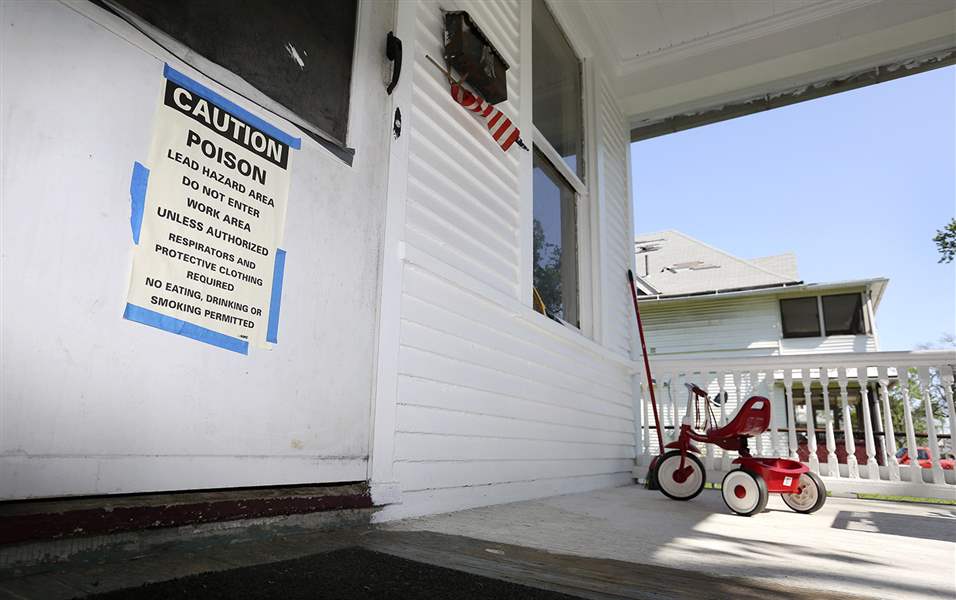
Toledo to review lead-safe rules
City council may extend, stagger compliance deadline and eliminate registry
4/12/2017
A lead hazard sign is posted on a home on Putnam Street last year.
THE BLADE
Buy This Image
City council will consider changes to Toledo’s rental lead-safe ordinance to extend and stagger the compliance deadline, eliminate a required registry of names and addresses of affected tenants, and create a hardship extension program to help landlords be in compliance.
Council members discussed the potential changes at a committee of the whole meeting Tuesday and are expected to vote on it next week.
The law requires rental properties with one to four units and day-care facilities to be inspected visually and tested for lead dust before the properties can be issued a lead-safe certificate and rented to tenants. Proposed changes would set staggered compliance deadlines by census tracts, beginning with those identified as having the highest risk for lead hazards to poison children.
Those in the first group would have to have their properties registered by June 30, 2018; the second group by June 30, 2019, and the third by June 30, 2020. It marks a significant extension from the original Sept. 17 deadline, when all of the estimated 50,000 affected units were to have been inspected and registered. To date, 60 properties have lead-safe certificates, according to the Toledo-Lucas County Health Department.
Scrapped in the amendment is the original requirement to submit tenant names and addresses from affected rental units as part of the certificate application, a provision that was unpopular with some tenants and landlords.
Health Commissioner Eric Zgodzinski said the changes will improve the law.
“This is the culmination of a lot of work looking at the old ordinance trying to make it better,” he said. “A lot of our concerns are alleviated. We’ve listened to not only the tenants but the landlords. ... I don’t think any of us got everything that we want. I think it’s a much better product, and implementing this is going to be a lot easier from the health department’s perspective now that we have the three-year roll out.”
The amendment uses an analysis from the Kirwan Institute for the Study of Race and Ethnicity at Ohio State University to identify high-risk census tracts using the number of rental properties within the census tract, age of the housing stock, and number of children with confirmed elevated blood lead levels to form a “targeted approach.”
Councilman Peter Ujvagi said the changes will help the law be successful.
“We are not removing the [dust] wipes,” he said. “For a lot of people that was their primary concern, but I think we’ve made some changes to make this good public policy.’’
Mr. Ujvagi stressed that the law is not going away, despite its detractors.
“This legislation, whatever form is going to be passed by city council, is the legislation that is going to be enforced. Many people have waited. Some people have waited so that the whole thing will be eliminated. That’s not going to happen.”
That didn’t stop several landlords and tenants from voicing displeasure during a public comment period; the audience several times had to be gaveled into silence after outbursts of applause or dissent during the meeting.
Many took umbrage at the provision which excludes Section 8 properties from the law, as those properties have to comply with lead-safe regulations from the U.S. Department of Housing and Urban Development. HUD does not require dust-wipe testing for its properties.
“I think we need to scrap the whole thing,” said Denis Bedard about the Toledo ordinance, adding that he’s been a landlord for 25 years. “A visual inspection is all that is really required. ... It works for Section 8, why we can’t do that here?”
Members of the audience at one point broke out into a brief chant to repeal the dust wipes.
Kathleen Gagen said she would like to see a requirement that lead inspectors undergo background checks for tenant protection. Mr. Ujvagi said they would consider it before next week’s vote.
Councilman Tom Waniewski questioned whether the data used to determine a census tract’s compliance date was effective because factors, such as the number of children with positive lead-poisoning tests, did not differentiate between those living in rental or owner-occupied units.
“We might be here in a year or two and see that the lead rates have not gone down,” he said.
The amendment has the support of Mayor Paula Hicks-Hudson, the health department, and the Toledo Lead Poisoning Prevention Coalition, officials told The Blade.
“We have refined the operations to roll it out so it is efficient,” the mayor said Tuesday. “My two goals are to reduce lead poisoning in children and to help owners upgrade their properties.”
The mayor said she is hopeful the law will not encourage landlords to abandon their properties because of potential costs to address lead issues.
“We are working on a hardship exemption,” she said. The hardship program outlined in the amendment would allow owners who fail an inspection to apply for additional time to comply with the ordinance.
Factors considered would include the financial status of the owner, number of properties owned, whether the property is in a historic district, the health risks of noncompliance to tenants, and the cost for required maintenance.
The Department of Neighborhoods could grant an extension of up to 18 months. The owner would not be fined for noncompliance during that period, though if a child is found to have lead poisoning at one of the owner's properties, the extension would be terminated 45 days from the date of discovery.
Though not in the current amendment, Mr. Ujvagi said officials are working to create an incentive program to waive the $45 filing fee for the property owners of the first 2,000 units to test and register their properties.
Staff writer Ignazio Messina contributed to this report.
Contact Lauren Lindstrom at llindstrom@theblade.com, 419-724-6154, or on Twitter @lelindstrom.